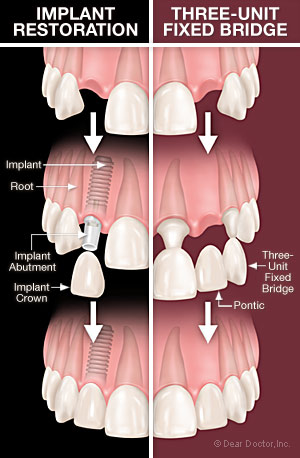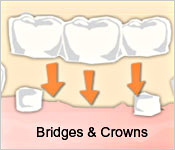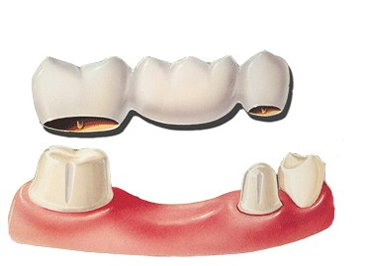Natural Smiles is your local dental bridge and implant specialist in Salem, Oregon. We take a holistic approach to replacing teeth based on your specific situation. By providing several options for extraction, bridges and tooth implants, we have the ability to tailor a plan to suit your smile and budget.
What Is a Fixed Dental Bridge?
Bridges are dental fixtures spanning an area in your mouth that has no teeth and is connected to natural teeth at each end. With a bridge, you will need to drill into an adjacent tooth. While this may be a disadvantage when dealing with perfectly healthy teeth, it may be beneficial if dealing with already filled teeth because this will strengthen them. A fixed dental bridge is a non-removable prosthesis attached to remaining natural teeth.
 The false tooth or teeth literally bridge the gap between natural teeth. For a long time, fixed bridges were the best alternative for people who had lost teeth, as they were quite successful and esthetically pleasing. Unfortunately, bridges can also present some problems because the natural teeth that lie on either side of the bridge are filed down to accept the appliance. This step in the bridge-making procedure may make these teeth prone to bacterial plaque accumulations, decay, periodontal disease, and the possible need for future root canals.
The false tooth or teeth literally bridge the gap between natural teeth. For a long time, fixed bridges were the best alternative for people who had lost teeth, as they were quite successful and esthetically pleasing. Unfortunately, bridges can also present some problems because the natural teeth that lie on either side of the bridge are filed down to accept the appliance. This step in the bridge-making procedure may make these teeth prone to bacterial plaque accumulations, decay, periodontal disease, and the possible need for future root canals.
Three Unit Bridges
Pros:
- Good aesthetics.
- Restores gaps reliably and predictably.
- Might be most economical permanent approach if the adjacent teeth already need fillings and dental crowns.
Cons:
- Over time the center tooth can develop a gap between the tooth and the gum as the bone shrinks underneath it. Requires removal of significant tooth structure on adjacent teeth, which is undesirable if the supporting teeth are free of tooth decay.
- Costs generally higher than either conventional or Maryland bridges.
- Susceptible to fracture.
- Decay or damage to the support teeth may require replacement of the entire bridge.
- Complicates use of dental floss with a potential for periodontal disease.
- You may need to drill through perfectly healthy teeth in order to attach a bridge, which is something you should consider.
 Dental Implants With Single Crowns
Dental Implants With Single Crowns
Dental implants are actually a series of procedures used to recreate a missing tooth. The key part of a dental implant is the initial titanium implant which sits in the bone where the original tooth was. The titanium works well with the bone and actually forms a bond with it over time, much like the original bond between the tooth and the jaw bone. This is essential as it prevents bone loss that would normally occur with any other type of tooth replacement. Dental implants are capped with a crown, which replicates the visible portion of a tooth, and in many cases, the replacement tooth will work just as well, if not better, than the original tooth. Dental implants or bridges can be used to replace just one or all of your missing teeth. Dental implants work and feel just like your natural teeth.
 Pros:
Pros:
- An implant replaces a missing tooth or teeth with something close to a natural tooth.
- Fills gap without grinding the adjacent teeth.
- Easy to floss between the teeth.
- Lasts for many years.
- Should something happen to the crown or if decay develops on adjacent teeth — the implant tooth isn’t affected.
- Least likely to cause periodontal disease with proper hygiene.
Cons:
- Takes a little more time to finish filling in the gap in the teeth. You need to undergo a minor surgery and will need time to heal.
- Some insurances don’t cover any of the cost.
- Does fix any of the teeth that are next to the gap being filled.
Remember whichever you choose, bridge or implant, you will need to maintain them just like your natural teeth. If you do not, they will fail and will need replacement in the future. To discuss your options with an implant dentist in Salem, Oregon, call Natural Smiles for a consultation and to schedule an appointment.
